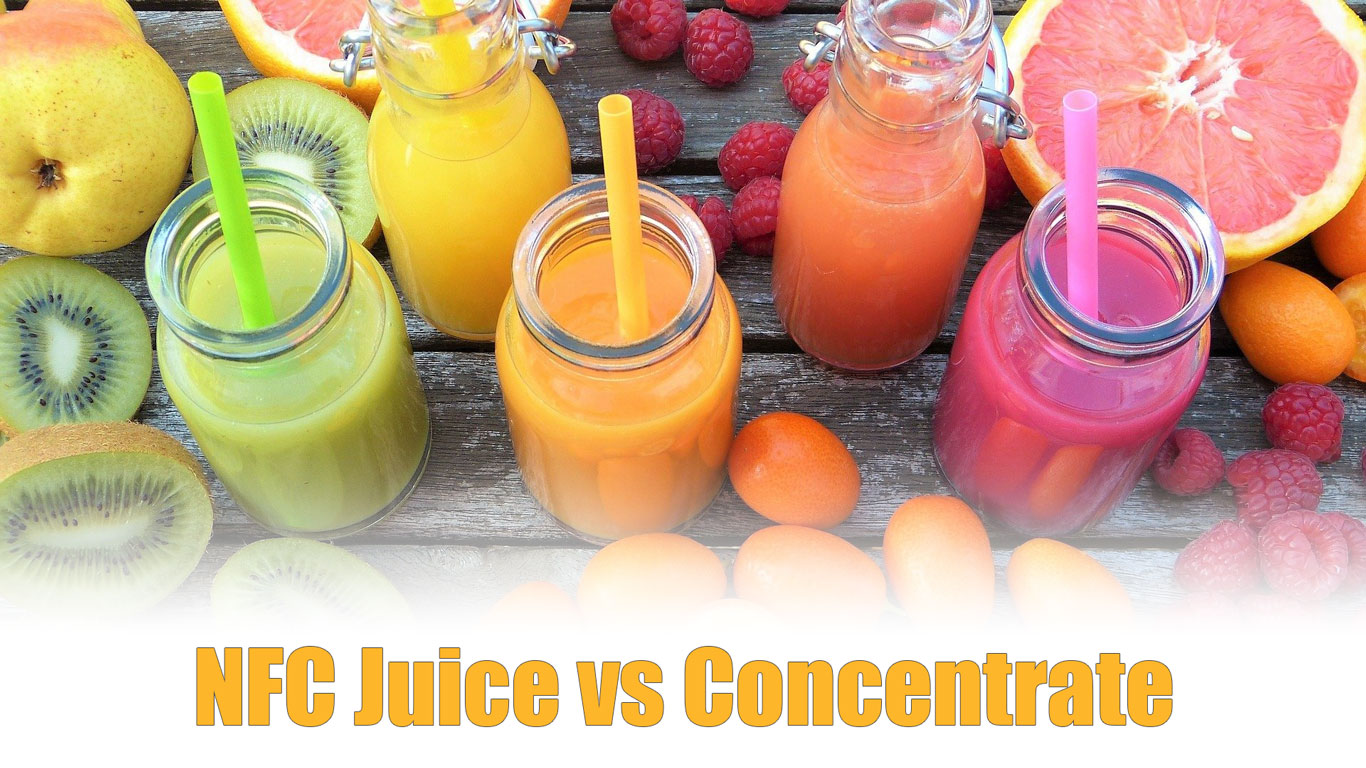Is NFC juice healthy? This question is shaping consumer choices in today’s beverage market. NFC or Not From Concentrate juice offers natural freshness and higher nutrient retention than concentrate. In this article, you will discover how NFC juice is produced and its health benefits for the body.
NFC Juice vs Concentrate
The debate between NFC juice and concentrate-based juice is central to understanding consumer choices in the beverage industry. To explore whether NFC juice is healthy, it is essential first to highlight how it differs from traditional juice concentrate.
Production process differences
NFC juice, which stands for Not From Concentrate, is produced by pressing fresh fruit and applying gentle pasteurization to preserve natural properties. The juice is packaged without reconstitution, meaning no water is removed and added back. In contrast, concentrate juice evaporates water from fruit juice to reduce volume, then is re-diluted with water during bottling. This process can diminish freshness and sometimes requires added flavors to restore taste.
The production of NFC juice ensures minimal processing, retaining the fruit’s original aroma, taste, and nutrient profile. This distinction is key to why health-conscious consumers increasingly prefer NFC juice over concentrate.

Taste and nutritional comparison
From a sensory perspective, NFC juice delivers a richer, more authentic fruit taste, resembling fresh-squeezed juice. Concentrated juice, while convenient and cost-effective, often lacks the depth of flavor because of evaporation and storage processes.
Nutritionally, NFC juice tends to preserve more vitamins, particularly vitamin C and natural antioxidants. While concentrated juice still offers nutritional value, it is more likely to lose delicate compounds during processing. The fresher profile of NFC juice positions it as the healthier option in terms of both flavor and nutritional impact.
These production and nutritional differences explain why NFC juice is a premium product, laying the foundation for deeper discussions about its health benefits.
Is NFC juice healthy?
“Is NFC juice healthy?” resonates with consumers and businesses alike. While no juice is a complete substitute for whole fruits, NFC juice offers distinct advantages, making it a wise beverage choice when consumed responsibly.

NFC juice nutrition facts
A typical serving of NFC juice contains natural fruit sugars, dietary fiber (depending on pulp content), and essential micronutrients. Vitamin C, potassium, and polyphenols are commonly preserved, making NFC juice supportive of immunity and metabolic health.
The exact nutritional profile varies by fruit type. For example, orange NFC juice is rich in vitamin C, while pomegranate NFC juice provides antioxidants linked to heart health. This diversity allows consumers to choose based on specific dietary goals.
Benefits of NFC juice
NFC juice provides hydration, natural vitamins, and energy in a convenient form. Its freshness appeals to people who want a ready-to-drink product without additives or artificial flavors. It is particularly valued for morning routines, fitness recovery, or a healthier soda alternative.
For businesses, highlighting these benefits helps attract health-conscious buyers, particularly millennials and young families actively seeking transparency in food and beverages.
Taken together, NFC juice provides significant nutritional value and is generally healthier than many processed beverages, provided it is consumed in moderation.
Health impacts of nfc juice on the body
Beyond basic nutrition, NFC juice influences specific areas of health. Understanding its impacts helps answer “Is NFC juice healthy?” more precisely.
Digestive health and hydration
NFC juice contains natural water content and electrolytes, which support hydration. Certain juices, such as pear or apple NFC juice, also provide mild dietary fiber that aids digestion. Regular hydration and digestive support make NFC juice an attractive choice for active individuals.
Immune system and vitamin intake
Citrus-based NFC juices like orange, lemon, and grapefruit are known for their high vitamin C content, contributing to immune defense. Antioxidants found in cranberry or pomegranate NFC juice help reduce oxidative stress, supporting cardiovascular health and long-term wellness.
NFC juice thus provides a convenient way to complement a balanced diet, ensuring adequate intake of vitamins and minerals often lacking in fast-paced lifestyles.

Potential risks of sugar consumption
Despite its advantages, NFC juice still contains natural sugars. Overconsumption may contribute to excessive calorie intake and blood sugar fluctuations. Nutritionists recommend limiting juice consumption to moderate daily servings, ideally paired with whole fruits to balance fiber intake.
For children and individuals managing weight or diabetes, portion control is significant. While NFC juice is healthier than soft drinks, mindful consumption ensures it remains beneficial rather than problematic.
Overall, NFC juice impacts the body positively through hydration, immunity, and nutrient supply, but should be integrated thoughtfully into a balanced lifestyle.
Is NFC juice healthy? The evidence suggests yes, especially when compared to concentrated or sugary alternatives. With its superior taste, higher nutrient retention, and natural profile, NFC juice is a healthier beverage choice. It supports hydration, immunity, and overall wellness, provided consumers are mindful of sugar intake and portion sizes.
For individuals, NFC juice represents a premium drink aligned with health-conscious living. For businesses, it signals a growing market opportunity fueled by global demand for natural, minimally processed products. Ultimately, NFC juice is both a refreshing option and a smart step toward healthier lifestyles.
